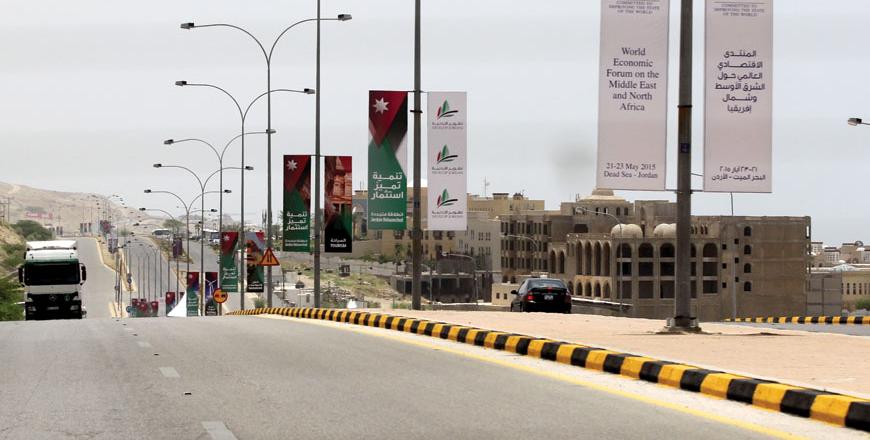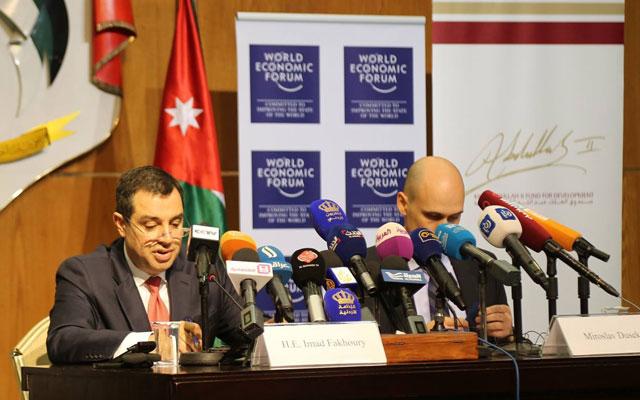You are here
WEF panellists call for public-private cooperation on infrastructure to bring regional stability
By JT - May 23,2015 - Last updated at May 23,2015

Business and government leaders take part in a session at the World Economic Forum on the Middle East and North Africa on Saturday (Photo by Raad Adayleh)
AMMAN — Business and government leaders at the World Economic Forum (WEF) on the Middle East and North Africa (MENA) on Saturday called on countries in the region to forge public-private partnerships to drive urgently needed infrastructure development.
Infrastructure development “is a huge opportunity not just because of the high youth unemployment and the need for facilities, but because interest rates have been low and there is a surplus in savings,” said meeting Co-Chair Gordon Brown, who served as British prime minister from 2007 to 2010 and currently chairs the WEF Global Strategic Infrastructure Initiative.
MENA countries spend only 5 per cent of their gross domestic product on infrastructure, compared with 15 per cent in China, a WEF statement quoted Brown as saying in a session on the issue.
With oil prices low, governments in the region can divert money that would normally go on energy subsidies to infrastructure development instead, he said, adding that, by doing so, “you can have a greater impact on the quality of life.”
Also speaking at the session, Hani Mulki, chief commissioner of the Aqaba Special Economic Zone Authority (ASEZA) in Jordan, said the public sector is the main investor in infrastructure in the region.
Infrastructure development must move forward, despite the geopolitical and economic instability in the region, Mulki told participants.
“We need the political will for these partnerships. We cannot wait for [the conflict with] Daesh to end. We need to get to work.”
Majid Jafar, CEO of Crescent Petroleum in the United Arab Emirates, agreed.
“We can’t wait for... stability to make the investments. The investments will lead to... stability.”
Cross-border infrastructure development would offer major benefits to the region, Mulki argued.
“We need to look at projects that transcend boundaries of countries. This will create an interdependent region. That should reduce risk. It would help minimise disparities in income. It would combat terrorism and extremism and, at the same time, provide for transparency.”
While certain countries, such as Jordan, have shaped frameworks for public-private cooperation on infrastructure, there are significant impediments to regional collaboration.
“We can’t ignore the politics,” Jafar said. “International trust is at its lowest level ever and that is an obstacle to cross-border investments and the multinational cooperation that we say we need.”
Thierry Déau, CEO of Meridiam Infrastructure in France, was optimistic.
“You can mobilise long-term capital if you have the right project partnership,” he said.
“There is a lot of capital in this region and it needs to commit to this region to give comfort to the capital from outside.”
Déau appealed to investors, including private institutions and sovereign wealth funds, to “commit to their own people”.
For his part, WEF meeting co-chair John Rice, the Hong Kong-based vice-chairman of GE, said MENA economies should focus on infrastructure aimed at meeting basic needs such as water and electricity.
He proposed that the World Bank and other international financial institutions relax their lending requirements for projects aimed at the bottom of the pyramid.
“Without sovereign guarantees, I don’t see foreign capital being available [for infrastructure development] at the level close to what is required,” Rice concluded.
Related Articles
AMMAN – His Majesty King Abdullah on Friday inaugurates the World Economic Forum (WEF), which will be held on the eastern shores of the Dead
Around 1,000 political and business leaders and representatives of civil society, international organisations, youth and the media from over 58 countries will participate in the World Economic Forum (WEF) that will be held in Jordan May 21-23 under the Royal patronage of His Majesty King Abdullah, organisers announced Tuesday.
DEAD SEA — The World Economic Forum (WEF) on the Middle East and North Africa (MENA) 2017 is a platform with the potential to make the long-













